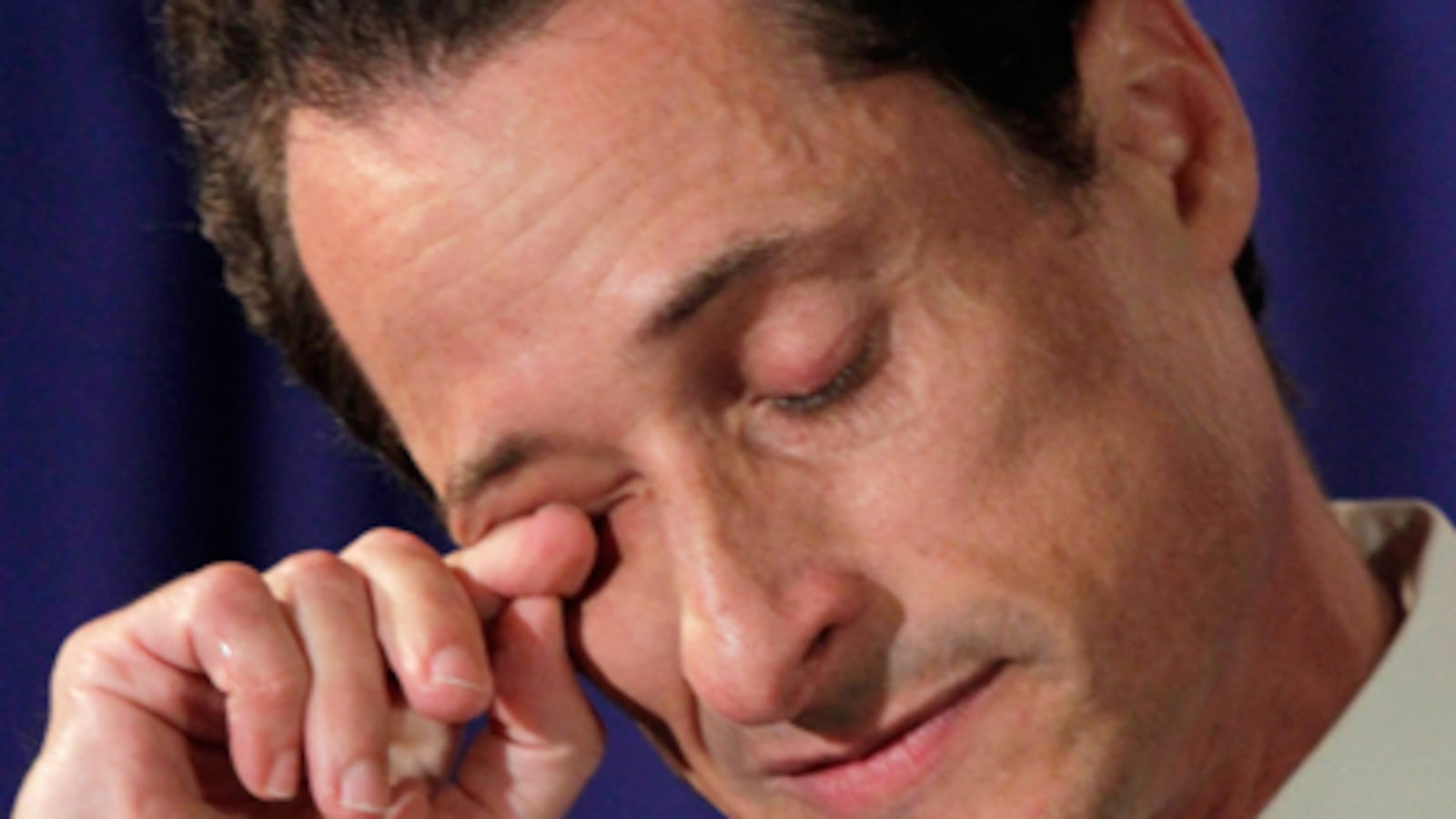Anthony Weiner often is described in the press as the protégé of Sen. Chuck Schumer (D-NY), the powerful Washington player who ranks third in the Senate Democratic caucus. Weiner worked on Schumer's congressional staff and then won Schumer's former seat in 1998, with Schumer's endorsement. He also clearly learned from the senator's knack for getting in the news.
But the similarities end there. In fact, a better role model for Weiner might have been Ed Koch, the former three-term New York City mayor who had previously served in Congress. Like Koch, Weiner has cultivated an image as an aggressive New Yorker with the attitude of someone with mayoral ambitions, rather than remaining a Washington legislator. Weiner also has tried to assemble the same political coalition that Koch relied upon: middle-class, outer-borough white ethnics who lean left on most domestic issues but more rightward on foreign policy and crime, coupled with reformist, left-wing professionals.
As Steve Kornacki explains in Capital New York, Weiner's recent star turn as an outspoken proponent of liberal causes, such as single-payer health insurance, was as much about running for mayor as an indication that he had developed greater interest in national issues. Weiner's heightened national profile, along with his strong showing in the 2005 Democratic mayoral primary, had made him the frontrunner for mayor in 2013.
Weiner's spectacular implosion over the last week means he almost certainly will not run for mayor two years from now, leaving the field for the top job in the nation's biggest city wide open. "Whether Anthony has made that decision or not, he can't win," says Bill Cunningham, a New York political consultant who worked for Mayor Mike Bloomberg. "He will not be mayor. He has a lot of money in the bank, but when you're in the situation he's in, it often turns into your legal fund."
So who is helped, and who is hurt, by Weiner's meltdown, and who are we likely to see in City Hall in 2014? Here's a guide to the Weiner scandal's political winners and losers.

Potential Winners
• New York City Public Advocate Bill de Blasio: The biggest winner is probably de Blasio, who occupies an unusual office that roughly translates to "mayoral candidate-in-waiting." De Blasio, who represented most of Park Slope, Brooklyn—where Weiner grew up—in City Council, is a good-government liberal whose base is rooted in "brownstone Brooklyn" and organized labor. With Weiner in the race, de Blasio might not have even dared to run. But with the congressman out, he may see an opening to pick up many Weiner supporters, positioning himself as both the outer-borough candidate and the liberal spokesman for gentrified Manhattan and Brooklyn.
• Manhattan Borough President Scott Stringer: Stringer is not well-known in the outer boroughs, and so his strategy, say New York political observers, will be to run the table in Manhattan and get into a runoff. That would have been hard with Weiner likely winning much of the Upper West Side liberal vote. But now, especially if de Blasio doesn't run, Stringer might vie for the influential New York Times endorsement, and also the limousine-liberal votes in some outer-borough enclaves such as Brooklyn Heights and Riverdale. Stringer's slim chances may have just been slightly widened.
• City Council Speaker Christine Quinn: Quinn, who lives in Chelsea, would be the first woman, and first openly gay person, to serve as New York mayor, and she has been unofficially running for years. She was expected to be one of Weiner's chief rivals in 2009, but a scandal broke in 2008 involving accusations that she earmarked funds for phony nonprofits in order to create a slush fund to dole out political patronage spending. Seeing that she was weakened in the next election cycle, Quinn heartily endorsed Mayor Bloomberg's scheme to overturn the city's term-limits law so he could run for reelection—and she could wait until 2013, when memories of the allegations would have faded. The result? She ceded the anti-Bloomberg vote to Weiner. Those voters may not go to her with the congressman out of the race, but maybe some of his Queens supporters will.
• New York City's Congressional Democrats: With New York state set to lose two congressional seats, the city is likely to lose one district when congressional boundaries are redrawn this year. Parties protect their incumbents in the redistricting process, but Weiner is an incumbent who no one will feel obliged to protect. "If he steps down, the interim congressman will have no seniority," says Cunningham. "So you're going to have a freshman or a very damaged congressman, while other congressmen will plead with the state legislature to take their seniority into account." Democratic state legislators, who aren't especially close to Weiner, are now free to carve up his district, in conjunction with eliminating one Republican seat upstate. Other Democratic congressmen, such as Rep. Greg Meeks, who also hails from Queens and whose district was thought to be potentially on the chopping block, should breathe a sigh of relief.
Potential Winner—or Loser
• Former City Comptroller Bill Thompson: In 2009, Bloomberg looked unbeatable, with his solid record on crime and education and his infinite personal war chest. Weiner bowed out when Bloomberg got the term-limits law changed. Thompson, an African-American veteran of local politics who is not known for his charisma, surprised local observers by losing to Bloomberg by only 4.5 percentage points, despite being outspent 14 to 1. Having taken up much of Weiner's anti-Bloomberg mantle, and with a base among the city's large black population, Thompson might be more inclined to run again, seeing a clearer path to the Democratic nomination without Weiner in the field. On the other hand, the template for minority candidates in New York often is to hope that the white candidates will split the white vote, as Weiner and City Council Speaker Gifford Miller did in 2005, allowing Bronx Borough President Fernando Ferrer to win the Democratic nomination. If Thompson does run, he may pick up Weiner voters who are more mainstream outer-borough Democrats, and anti-Bloomberg voters, but he may also be hurt if a sufficient portion of the white vote coalesces around one candidate.
Potential Losers
• City Comptroller John Liu : Liu, New York's first citywide Asian-American elected official, won his job in 2009 with a "rainbow coalition" of African Americans, Latinos, and Asian Americans. If Thompson is enticed into the race by Weiner's absence, Liu, who is assumed to be running for mayor, will see some of his demographic pie sliced off. "Liu's problem is, how does he create a citywide coalition with Thompson in the race?" says Cunningham. "If Thompson gets in, it could hurt Liu because he has to figure out how to build a coalition with Thompson taking the lion's share of African-American votes."
• Outer-borough white Democrats: The two main white candidates—Stringer and Quinn—both hail from Manhattan. If de Blasio runs, he will try to replace Weiner as the candidate of the ignored outer-boroughs, but he comes from a somewhat Manhattanized portion of Brooklyn. The outer-borough white ethnic bloc, which once exercised vast influence in city politics, hasn't put one of its own in City Hall since Abe Beame in 1973, and isn't likely to this time either.






